外研版八年级Module 4 Unit 1导学案
八年级英语下册 module 4 unit 1导学案 外研版

外研版八年级下册英语module 4 unit 1导学案Module 4 New technologyUnit 1 If you want to record, press the red button.教师寄语: Anything is possible.课型:Listening and speaking【学习目标】1.知识目标:掌握下列重点单词和短语的意思及用法:press ,button, instruction, video, video camera, copy, memory, turn on, Irish, lend, recorder, second,playback, come on, lady, gentleman2. 能力目标:1)能通过预测和速记等方法听懂科技产品操作的指令语,能简单讲解怎样使用某种简单设备。
2)能在实际情境中应用“if引导的条件状语从句+祈使句”句式。
如:If you want to record, press the red button.3. 情感目标:鼓励学生大胆尝试使用新产品,增加对这些技术设备的了解,培养学生对科学技术的热爱和探索精神,提高生活质量。
【教学重难点】1.重点句式:if引导的条件状语从句+祈使句2.难点:在实际情境中应用if引导的条件状语从句+祈使句。
【教学过程】[课前朗读] 朗读词汇:press ,button, instruction, video, video camera, copy, memory, turn on, Irish, lend, recorder, second,playback, come on, lady, gentleman根据音标读出单词并了解汉意,养成学生自主学习词汇的习惯,促使学生迅速进入学习状态。
[检查词汇预习]a.采取学生结对、小组互查等形式来检查学生对词汇的预习情况。
b.朗读单词,注意发音。
2022年外研版八上《Module 4 Unit 1 》导学案
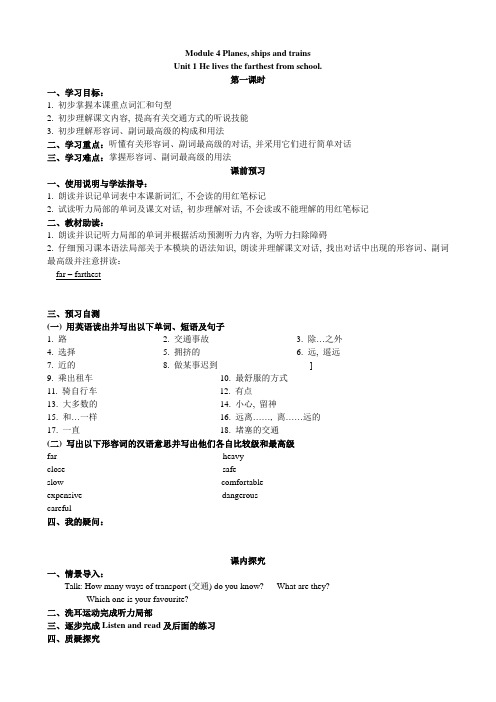
Module 4 Planes, ships and trainsUnit 1 He lives the farthest from school.第一课时一、学习目标:1. 初步掌握本课重点词汇和句型2. 初步理解课文内容, 提高有关交通方式的听说技能3. 初步理解形容词、副词最高级的构成和用法二、学习重点:听懂有关形容词、副词最高级的对话, 并采用它们进行简单对话三、学习难点:掌握形容词、副词最高级的用法课前预习一、使用说明与学法指导:1. 朗读并识记单词表中本课新词汇, 不会读的用红笔标记2. 试读听力局部的单词及课文对话, 初步理解对话, 不会读或不能理解的用红笔标记二、教材助读:1. 朗读并识记听力局部的单词并根据活动预测听力内容, 为听力扫除障碍2. 仔细预习课本语法局部关于本模块的语法知识, 朗读并理解课文对话, 找出对话中出现的形容词、副词最高级并注意拼读:far – farthest____________________________________________________________________________________________________________________________________________________________________________________________________________________________三、预习自测(一) 用英语读出并写出以下单词、短语及句子1. 路2. 交通事故3. 除…之外4. 选择5. 拥挤的6. 远, 遥远7. 近的8. 做某事迟到]9. 乘出租车10. 最舒服的方式11. 骑自行车12. 有点13. 大多数的14. 小心, 留神15. 和…一样16. 远离……, 离……远的17. 一直18. 堵塞的交通(二) 写出以下形容词的汉语意思并写出他们各自比较级和最高级far heavyclose safeslow comfortableexpensive dangerouscareful四、我的疑问:__________________________________________________________________________________________________________________________________________________________课内探究一、情景导入:Talk: How many ways of transport (交通) do you know? What are they?Which one is your favourite?二、洗耳运动完成听力局部三、逐步完成Listen and read及后面的练习四、质疑探究自读课文, 并能翻译、背诵、默写以下重点句型.1.What happened?2.Maybe I should go to school by taxi.3.It’s the most comfortable way, but it’s also the most expensive.4.Then what about going by bike? That’s a good choice.5.Don’t worry. I’ll be careful!6.He lives the farthest from school.[五、当堂检测Work in groups. Make dialogues talking about your favourite way of transport.六、课后反思_____________________________________________________________________________ _____________________________________________________________________________课后训练一、写出以下形容词和副词的比较级和最高级1. tall2. long3. short4. large5. close6. late7. big 8. hot 9. busy10. easy 11. comfortable12. expensive 13. dangerous二、单项选择( ) 1. I want to go to Beijing _______ because I can see the beautiful scenery all the way.A. by a trainB. take a trainC. on trainD. by train( ) 2. Traveling by plane is the most comfortable, but it is also the _________.A. expensiveB. most expensiveC. cheapD. cheapest( ) 3. My uncle lives ________ his factory, so he goes to work by train.A. farB. far fromC. closeD. close to( ) 4. Everybody is here ________ Tom , because he is ill in hospital .A. exceptB. besidesC. except thatD. beside( ) 5. --- I can’t carry the box , Mum .--- _________, I can help you.A. OKB. Don’t worryC. That’s all rightD. you’re welcome 课后学习指导:朗读对话注意语音语调, 并注意形容词、副词最高级的拼读第二课时一、学习目标:1. 熟练掌握本课重点词汇句型, 并能准确、熟练写出所学形容词、副词的最高级2. 能听懂和理解有关不同交通方式的话题, 培养听说技能3. 能用形容词、副词最高级进行有关描述自己喜欢的交通方式的简短对话二、学习重点:掌握形容词、副词最高级的用法三、学习难点:通过对话学会采用形容词、副词最高级描述自己喜欢的交通方式课前预习一、使用说明与学法指导:1. 通过语音训练拓展日常交际用语2. 通过对话表演方式大胆开口, 能用英语进行有关交通方式的交流3、观察对话总结形容词、副词最高级的变化规那么二、教材助读:朗读并理解语音局部的词句, 注意结对反复练习句子重读三、预习自测(一) 小组合作练习Activity 6中的重读单词, 相互纠正(二) 结对练习Activity 7局部, 注意结合Activity 6的知识读出句子重读局部四、我的疑问:__________________________________________________________________________________________________________________________________________________________课内探究一、情景导入Work in pairs. Talk about different ways of transport.二、按要求完成语音局部注意英语口语中的重读现象三、质疑探究知识要点探究1. What happened? 发生什么事了?happen动词, “发生〞, 强调偶然性;常常与之相区别的是take place, 也表示“发生〞, 但强调方案性. happen 与take place的主语都只能是事情, 不能是人, 假设要表达“某人发生了某事〞那么使用短语“sth. happen to sb.〞牛刀小试:选词填空, 注意单词形式happen / happen to / take placeThe accident ________________ at about twelve o’clock last night.The school sports meeting __________________ in April every year.What ____________________ the old man?2. Nobody was late, except me. 除了我, 没有人迟到.except介词, “除……之外〞, 不包含所除去的对象, 常常强调整体与局部的关系;与之相区别的短语as well as有时也被翻译为“除了……〔还有〕;以及〞, 是包含了所罗列的对象的, 起连接作用, 注意区别.牛刀小试:选词填空并翻译成汉语:except / as well asI like all kinds of sports, ________________ running.He gave me lots of clothes ________________ much food.Everybody is here, _________________ Li Min.Daming, as well as Betty, went for a walk with me.3. It’s a bit dangerous. 这有点危险.a bit“一点, 有点〞, 在此句中修饰形容词dangerous, 相当于a little.拓展:注意a bit 与a little的联系与区别:修饰名词:a little + 不可数名词= a bit of + 不可数名词牛刀小试:Could you please speak _________________ more loudly? I can’t hear you.请你说大声一点好吗?我听不见你说话.I need ___________________ time to finish it.我需要一点点时间完成.4. He lives the farthest from school, so he takes the underground.他住得离学校最远, 所以乘地铁.Her home is the closest to school, so she walks.她家离学校最近, 所以步行.①句中的farthest是far〔“远的〞〕的最高级形式, 在此处作副词用, 修饰动词live. 固定短语far ________ ….意思是“离……远的;远离……〞.②句中的closest是close〔“近的;亲近的〞〕的最高级形式, 在此处作形容词用. 固定短语close _______ …意思是“离……近的;与……亲近的〞牛刀小试:Lisa comes from London and her home _________ _________ _________ the Tower Bridge. 丽莎来自伦敦, 她家离伦敦塔很近._________ your school __________ __________ the centre of the city?你们学校离市中心远吗?5. He goes by bus too, the same as me. 他也乘公交车, 和我一样.same形容词, “一样的, 相同的〞, 一般在它前面加上定冠词the, 短语the same as …意思是“__________________〞, 反义短语是____________________________“与……不同〞.牛刀小试:根据句意用以上短语填空:My favourite sport _________ _________ _________ _________ yours. That means our favourite sports __________ __________ __________ each other.四、当堂检测根据提示完成句子1. Julia is good at all subjects, e_____________ maths.2.They had no _______________ (选择).3. The church is c____________ to the bus stop, so you can walk there.4. It’s too c____________ on buses, so I don’t like travelling by bus.5. Wang Hui jumps the _______________ (最远地) and he is the winner.五、课后反思__________________________________________________________________________________________________________________________________________________________课后训练一、用所给词的适当形式填空1.I think traveling by plane is the ____________________ (comfortable) way.2.It’s too far . How about _________________ (go) by taxi?3.I think it’s a good _________________ (choose) to go abroad.4.The b us is very ___________________ (crowd). Let’s take a taxi to school.5.You should be ___________________ (care) when you cross the river.二、单项选择( ) 1. I want to go to Beijing _______ because I can see the beautiful scenery all the way.A. by a trainB. take a trainC. on trainD. by train( ) 2. Traveling by plane is the most comfortable, but it is also the _________.A. expensiveB. most expensiveC. cheapD. cheapest( ) 3. My uncle lives ________ his factory, so he goes to work by train .A. farB. far fromC. closeD. close to( ) 4. Everybody is here ________ Tom, because he is ill in hospital.A. exceptB. besidesC. except thatD. beside( ) 5. --- I can’t carry the box, Mum.--- _________, I can help you.A. OKB. Don’t worryC. That’s all rightD. you’re welcome三、根据提示完成以下句子1.但是没有人迟到, 除了我.But nobody was late, ______________________ .2.--- 贝蒂怎样去上学?--- 骑自行车.--- __________________ Betty go to school? --- ____________ bike.3.这是最舒服的方式但也是最昂贵的.It’s ________________________ way but it’s also __________________________.4.乘出租车去怎么样?_______________________________ by taxi?5.她家离学校最近.Her home is ____________________________ school.6.他住得离学校最远.He lives ____________________________ school.第一课时一、学习目标:1. 初步掌握本课重点词汇和句型2. 初步理解课文内容, 提高有关英语学习话题的听力技能3. 熟悉给别人提建议的方法二、学习重点:通过对话初步掌握给别人提建议的方法三、学习难点:理解并初步掌握对话中出现的提建议的各种句型课前预习一、使用说明与学法指导:1. 朗读并识记单词表中本课新词汇, 不会读的用红笔标记2. 试读听力局部的单词及课文对话, 初步理解对话, 不会读或不能理解的用红笔标记二、教材助读:1. 朗读并识记听力局部的单词并根据活动预测听力内容, 为听力扫除障碍2. 朗读并理解课文对话, 找出对话中提出建议的句子:_____________________________________________________________________________ _____________________________________________________________________________ _____________________________________________________________________________ _____________________________________________________________________________ 三、预习自测(一) 用英语读出并写出以下单词1 . 语法2 . 使完全3 . 句子4 . 改正5 . 拼写6 . 练习7 . 词典8 . 字母9 . 理解、明白10 . 建议11 . 应该12 . 发……的音13 . 大声地14 . 电台, 播送15 . 关键性的16 . 主要的17 . 极好的, 优秀的(二) 翻译以下短语, 并把它们背下来1 . 查阅, 查找2 . 犯错误3 . 写下, 记下4 . 同意某人5 . 需要做某事6 . 像……一样重要7. 联系做某事8. 给某人建议四、我的疑问:_____________________________________________________________________________ _____________________________________________________________________________课内探究一、情景导入:What does English include (包含)?How do you learn English?Do you have any advice for learning English well?二、洗耳运动完成听力局部三、逐步完成Listen and read及后面的练习四、质疑探究熟读以下句子, 组内相互练习, 并思考讨论其中包含的句子结构:1 . We should always speak English in class.2 . Let’s try to s peak English as much as possible.3 . Why not write down the mistakes in our notebooks?4 . Don’t forget to write down the correct answers next to the mistakes.5 . It’s a good idea to spell and pronounce new words aloud every day.6 . How about listening to the radio?7 . You just need to listen for key words and main ideas.]8 . Why don’t we try to find some English pen friends?五、当堂检测一、根据句意及汉语提示完成单词.1 . Could you please speak again ? I can’t u______________ you .2 . Li Mei __________________ (练习) speaking English every morning .3 . There are 26 l__________________ in English .4 . Let’s try to speak English as much as P__________________ .5 . ________________ (完成)the sentences with the correct form of the words .6 . Lin Shuhao is an ____________________ (优秀的) basketball player in NBA.7 . Could you tell me how to ____________________ (发音) the word ?8 . You should read English newspapers ___________________ (大声地) .9 . The ________________ (播送) says that it is going to rain tomorrow .10 . What’s the ___________________ (主要的) idea of this passage ?二、用所给词的适当形式填空.1.Why don’t you _________________ ( listen ) to the radio now ?2.What’s the Chinese _________________ ( mean ) of this word ?3.I’m sorry your _________________ ( spell ) is w rong again .4.Jack made a few __________________ ( mistake ) in the English exam .5.Little Tom wants to know the __________________ ( pronounce ) of this word .六、课后反思_____________________________________________________________________________ _____________________________________________________________________________课后训练一、单项选择( ) 1. Miss Liu gave us _________ about how to learn English.A . some advice B. some advices C. a good advice D. an advice ( ) 2. Here are some phone numbers. Please __________ in your notebook.A. write down themB. write them downC. write down itD. write it down( ) 3. If you don’t know the word, you can find its ____________ in the dictionar y.A. translateB. to translateC. translatingD. translation ( ) 4. __________ make a birthday card for her?A. Why don’tB. How aboutC. Let’sD. Why not ( ) 5. __________ playing computer games?A. Why notB. Shall weC. How aboutD. Why don’t you ( ) 6. It’s bad for you to copy(抄袭) others’ homework . __________ do it again.A. Don’t tryB. Not try toC. Try not toD. Try not二、按要求完成以下各题.1 . Let’s read an English newspaper every day. (改为同义句)___________ __________ reading an English newspaper every day?2 . You should drink more water. (改为否认句)You ___________ ____________ drink more water.3 . Why don’t you walk to s chool? ( 改为同义句)____________ ______________ walk to school?4 . Spelling new words every day is a good idea. (改为同义句)____________ a good idea ___________ spell new words every day.5 . 我们应该相互帮助. (根据汉语提示完成句子)We ___________ help ____________ ____________.课后学习指导:仔细理解课文对话, 熟读并在组内分角色朗读第二课时一、学习目标:1. 熟练掌握本课重点词汇和句型2. 能听懂和理解与英语学习相关的话题3. 熟练掌握给别人提建议的方法二、学习重点:通过对话学会给别人提建议三、学习难点:通过对话学会给别人提建议课前预习一、使用说明与学法指导:1. 通过语音训练拓展日常交际用语2. 通过对话表演方式大胆开口, 能用英语进行有关英语学习话题的交流3、观察对话总结给别人提出建议的方法二、教材助读:1. 朗读并理解语音局部的句子, 注意语音语调2. 通过提示试着理解活动七的题意并思考该活动三、预习自测根据汉语提示翻译以下句子:1. 我们为什么不把他们写下来呢?________________________________________________2. 你应该及时(in time)纠正练习中的错误. __________________________________________3. 每天读英语报纸是一个好主意. _________________________________________________4. 经常检查你的词汇笔记本怎么样?______________________________________________5. 尽量不要将查阅每一个单词. ___________________________________________________6. 非常感谢, 托尼. ______________________________________________________________7. 玲玲经常帮助他的妈妈做家务. _________________________________________________8. 这是一个好主意. _____________________________________________________________9. 我们需要尽可能多地读英语报纸. _______________________________________________10. 别忘了每天听播送. __________________________________________________________四、我的疑问:_____________________________________________________________________________ _____________________________________________________________________________课内探究一、情景导入思考:How can we give others some advice?二、按要求完成语音局部两个活动三、质疑探究(一) 通过本课的学习, 归纳运用以下句型结构, 并相互练习:1. Why don’t we / you …?2. We / You should …3. It’s a good idea to …4. How about …?5. Let’s try to …6. Don’t forget to ...(二) 知识要点探究1. Why don’t we try to find some English pen friends? 我们为何不尽量找一些英国笔友呢?Why not write down the mistakes in our notebooks? 为何不在我们的笔记本里记下错误呢?1〕这里Why don’t we do…? 是用来表示提出某种建议, 而不是询问为什么不做某事的原因. 其简略形式为: Why not do…? 如:Why don’t you ask the teacher? = Why not ask the teacher? 为何不问问老师呢?2〕也可以用What about / How about…? 来提出建议, about为介词, 后接名词或动名词-ing形式. 如:What about taking little Tom along with us?3〕还可以用Would you like…? 来提出建议, 意为“你想要…吗?, would like 后可接名词或动词不定式. 如: Would you like a cup of tea? 你想要杯茶吗?Would you like to go and see her? 你想要去见她吗?牛刀小试:如果我们要提建议“我们去散步〞, 在英语中可有这几种表达法:____________________________________________________________________________________________________________________________________________________________________________________________________________________________________________________________________________________________________________________2. What else? 还有什么吗?else为形容词, 意为“别的;其他的〞, 一般放在特殊疑问词或不定代词的后面. 如:Who else did you see at the meeting? 你在会上还看到谁了?Dose anyone else want to read this book? 还有其他人想要看这本书吗?other也表示“其他的〞, 但只能用于修饰名词并放在名词前. 如:Did you see other classmates? 你看到其他同学了吗?They left early and other friends left late. 他们很早就离开了, 其他朋友离开得晚.牛刀小试:English is difficult for him, but nothing ________ is.对于他来说英语很难, 但其他没有什么是困难的.I will finish my homework first and then do ___________ things.我将首先完成家庭作业, 然后做其他事情.3. It’s a good idea to spell and pronounce new words aloud every day.每天大声拼读新词是一个好主意.句中it 是形式主语, 后面的动词不定式短语to spell and pronounce new words aloud every day是真正的主语.注意:在“ It is + a dj.+ of / for sb. + to do sth.〞句型中, 假设形容词是描述不定式行为发出者的性格、品质的, 如:kind, good, nice, right, wrong, clever, careful, polite等, 介词用of;假设形容词仅仅是描述事物的特征, 如:difficult, easy, hard, important, dangerous等, 介词那么用for. 如:It’s very kind of you to help me. 你能帮我真好.It’s cl ever of you to finish the exercises so quickly. 你真聪明, 这么快就完成了这些联系.牛刀小试:It’s very dangerous _______ children to cross the busy street.对孩子来说, 穿过这条交通繁忙的街道是危险的.It’s difficult _______ us to finish the work. 对我们来说, 完成这项工作很困难.It’s a good way ___________ d own the new words. 记下新词是一个好方法.4. Let’s try to speak English as much as possible. 我们尽可能多地说英语吧.try to do sth. 表示“尽力/努力做某事〞. try (not )to do sth. 表示“尽力(不要)做某事〞. 如:类似的结构还有:ask sb. (not) to do sth. 叫某人〔不要〕做某事;tell sb. (not) to do sth. 告诉某人〔不要〕做某事.拓展:try还可以接动词的-ing形式表示“尝试、试图做某事〞. 如:You should try learning a new language. 你应该试试学一门新的语言.牛刀小试:翻译句子:这学期我们将努力学好所有学科. ______________________________________________Jack正在试着用筷子(chopsticks). ______________________________________________请告诉贝蒂不要等我. _______________________________________________________你叫丽莎买一份报纸了吗?__________________________________________________结构“as ... as possible〞表示“尽可能……〞, 相当于“as ... as sb. can / could〞.牛刀小试:Please write back ________ ________ ________ _________. 请尽快回信.Mrs Black gave me ________ ________ help ________ ________.布莱克夫人给予我尽可能多的帮助.Jane finished the work as quickly as possible. (转换同义句)Jane finished the work __________ __________ _________ __________ _________.四、当堂检测(一) 用单词的适当形式填空:1. The _____________ (spell) of the word is not right.2. It’s not a good idea to learn English by _______________ (translate).3. My grandfather always reads some _______________ (newspaper) before breakfast.4. There are all kinds of _____________ (radio). Which one do you like?5. The boy wasn’t careful and he made some ______________ (mistake) in his homework.(二) 用方框内适当单词的正确形式填空correct, match, term, message, excellent, number, orchestra1. Kate said, “I should study hard this ____________.〞2. How about ____________ the right pictures with the letters?3. Could you please help me find out the ___________ spelling of this word?4. David is an ___________ student in our school ____________.5. My sister isn’t at home. Can I take a ____________ for you?五、课后反思__________________________________________________________________________________________________________________________________________________________课后训练一、单项选择( ) 1 . Miss Liu gave us _________ about how to learn English.A . some adviceB . some advicesC . a good adviceD . an advice( ) 2 . Here are some phone numbers, please __________ in your notebook.A . write down themB . write them downC . write down itD . write it down( ) 3 . If you don’t know the word , you can ____________ in the dictionary.A . look up itB . look after itC . look it upD . look for them( ) 4 . __________ make a birthday card for her?A . Why don’tB . How aboutC . Let’sD . Why not( ) 5 . Don’t forget _________ the door when you leave home.A . closeB . closedC . closingD . to close ( ) 6 . __________ playing computer games?A . Why notB . Shall weC . How aboutD . Why don’t you ( ) 7 . It’s better __________ early in the morning.A . startB . to startC . startingD . started ( ) 8 . I think English is as ___________ Chinese.A . important asB . important thanC . more important thanD . important ( ) 9 . It’s bad for you to copy others’ homework . __________ do it again.A . Don’t tryB . Not try toC . Try not toD . Try not ( ) 10 . It will be sunny soon. You don’t need __________ an umbrella .A . to takeB . takeC . takingD . took二、按要求完成以下各题.1 . Let’s read an English n ewspaper aloud. (改为同义句)___________ __________ reading an English newspaper aloud?2 . You should drink more water. (改为否认句)You ___________ ____________ drink more water.3 . It’s a good idea to write new words in groups.(对画线局部提问)___________ ____________ a good idea?4 . Why don’t you walk to school? ( 改为同义句)____________ ______________ walk to school?5 . Spelling new words every day is a good idea. (改为同义句)____________ a good idea ___________ spell new words every day.。
外研版八上英语导学案设计Module 4 unit1

Module 4 Planes, ships and trains Unit1 He lives the farthest from school.导学案八年级英语课型:听说课授课时间:9.26 序号:学习目标1.知识目标:重点词汇、短语的理解和掌握2.技能目标:能听懂含有形容词、副词最高级形式的对话及旅行方式和交通工具的描述。
能够使用形容词、副词最高级形式谈论并比较旅行方式和交通工具。
(重难点)3.情感态度价值观:主动了解英语国家有关旅游交通等方面的信息,并于日常生活相互联系,拓展视野激发英语学习兴趣;选择安全合理的出行方式。
导学过程Learning procedures一、Warming up①Check the new words in pairs.1.公路2.交通事故,意外事件3.除。
之外4.选择5.同班同学6.远,遥远的(地) adj/adv7.远离8.近,接近的(地)adj/adv9.拥挤的,人数过多的10.一直,不断地②Listen to the English song and guess the name of this song.二、Pre-taskLook at the pictures and discuss.1 / 3What do you think of the advantages of these different means of transportation ?Do you know other means of transportation?三、While-task①Listen and match the words in the box with the pictures above. You need to use one word more than once.②Talk about different means of transportation according to what you have listened.1.What is ____________(最先进的) train in the world now?2.----What’s ___________(最昂贵的)way to travel around London?----Maybe it’s _______(乘出租车).3.What’s ___________(最便宜的)way to travel around Beijing?The Tokyo underground is ________(最繁忙的) underground in the world.③Listen to the tape and and choose the correct answer.1.Betty was late for school because _______.A.There was a road accidentB.She went to school by bike.C.She lives the farthest from school.2.Who lives the farthest from school?A.TonyB. LinglingC. DamingListen again and answer the questions.1.What is the most comfortable way to go to school?2.How do most of Betty’s classmates go to school?1 2 345 62 / 33.How does Tony go to school? Why?4.How does Lingling go to school? Why?5.Does Daming go to school by bike?四、Post-taskWork in pairs. Ask and answer questions about the ways of going to school.Use the words in the box to help you.bike bus cheap comfortableCrowded expensive fast popular—What’s the most expensive way to go to school?—Going by taxi is the most expensive.3 / 3。
外研版-英语-八上-Module4 1单元导学案

Module 4 Unit 1 He lives the farthest from school 导学案课型:听说课Ⅰ、学习目标1、by 和表示交通工具的名词连用。
2、形容词和副词的最高级。
Ⅱ、学习过程:一、课前预习1、New wordsroad accident except choice classmate closeall the time journey book outside far from cost2、回忆一下形容词和副词最高级的构成,写出下列单词的最高级形式:1. short → _________________6. beautiful → _________________2. nice → _________________ 7. carefully → _________________3. big → _________________ 8. badly →________________4. thin → _________________ 9. much → ________________5. early → _________________ 10. little → _________________二、课上探究1、Work in pairs.—— How do you often go to school?—— I often go to school... ...2、Activity 3 Listen and read.1)Listen and complete the table.2)Listen again and complete the sentences.(1). There was a road ________, so Betty was late for school.(2). Tony lives the __________ from school.(3). Lingling’s home is the _________ to school, so she always walks.III、课堂小结:这节课你学到了些什么?Read the dialogue in groups and then find out the language points. Talk about with your partners.Ⅳ、课堂达标1.She rides to school everyday. (改为同义句)She goes to school ____ ____ everyday.2.Who ran the ____, Tom, Lily or David?A. fartherB. farthestC. farD. most far3.. What about going by bike? (改为同义句)____ ____ going by bike?4.Going to work by taxi is the ____________ (comfortable) way of all.5.他住得离学校最远。
外研版英语八年级下册Module4 Unit1 精品教案
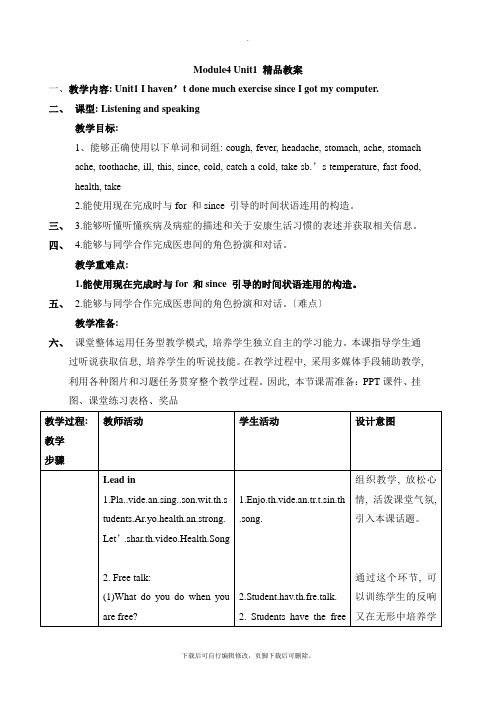
Module4 Unit1 精品教案一、教学内容: Unit1 I haven’t done much exercise since I got my computer.二、课型: Listening and speaking教学目标:1、能够正确使用以下单词和词组: cough, fever, headache, stomach, ache, stomachache, toothache, ill, this, since, cold, catch a cold, take sb.’s temperature, fast food, health, take2.能使用现在完成时与for 和since 引导的时间状语连用的构造。
三、 3.能够听懂听懂疾病及病症的描述和关于安康生活习惯的表述并获取相关信息。
四、 4.能够与同学合作完成医患间的角色扮演和对话。
教学重难点:1.能使用现在完成时与for 和since 引导的时间状语连用的构造。
五、 2.能够与同学合作完成医患间的角色扮演和对话。
〔难点〕教学准备:六、课堂整体运用任务型教学模式, 培养学生独立自主的学习能力。
本课指导学生通过听说获取信息, 培养学生的听说技能。
在教学过程中, 采用多媒体手段辅助教学, 利用各种图片和习题任务贯穿整个教学过程。
因此, 本节课需准备:PPT课件、挂图、课堂练习表格、奖品七、板书设计:Modul.4.Seein.th.doctor.Unit1..haven’puter.1) have got / have a stomach ache2. m.hea.hurts...hav..headache...hav..pai.i.m.head.3) ----How long have you been like this?----Since Friday.4) take one’s temperature5) catch a cold \have a cold6〕I haven’t done much exercise since I got my computer last year.7) I’ve been ill for about three days.8) Take it three times a day.9) be harmful to = do harm to。
Module4导学案外研版英语八年级上册

初二英语学业发展历案M4 Planes, ships and trainsU1 He lives the farthest from school.【学习目标】1.在语境中理解并认读下列词汇:road,accident,except,choice, far,far from,all the time.2.通过听和阅读对话,获取细节信息并借助提示简述对话内容;3.通过贝蒂和妈妈讨论上学的出行方式,学生交通安全意识得到增强。
【课前预习】一、词汇及拓展1. n.路;公路________2. n.交通事故;意外事件_______3. prep.除…之外________4. n.选择________ (v.)________(p.t.)_______5. n.同班同学________6. adv. adj.远;遥远的________7. 远离________ 8. adv. adj.近的;接近的(地)________9. adj.拥挤的________(v.)________ 10. 一直;不断地________二、翻译下列短语1. 迟到be late for2.发生了什么What happened?3.最舒服的方式the most comfortable way4.道路事故a road accident5.交通堵塞heavy traffic6.一个好的选择a good choice7.有点危险a bit dangerous8.乘坐地铁take the underground9. 和...一样the same as 10....中的大多数most of11.远离far from 12.那么的拥挤so crowded【课堂活动】I.Lead in: Free Talk Look at the pictures and talk about them. Use the words to help you.II.Listening(一)小听力。
外研版英语八年级下册Module4-Unit1-导学案

Module4 Unit1导学案课题课型讲课人班级时间Module4 unit 1 听说课三年五班2019.9.30【学习目标】Knowledge aims(知识目标):1.能学会并运用本单元的单词和短语。
2.能掌握for 和since的现在完成时态。
Ability aims(能力目标):1.能了解有关疾病的描述;2.能就医生和病人展开简单的对话Moral aim(情感目标) :通过本单元“看病就医”内容的学习,引起学生对身体健康的关注,引导学生养成良好的生活习惯。
【重点及难点】重点:本单元的单词、短语、及句型。
难点:现在完成时在医生和病人之间的运用。
【学习步骤】:一、【自主学习】1.课前利用思维导图的形式,学生查找有关疾病的单词。
illness es1.感冒_______________________2.咳嗽_________________________________3.头疼_________________________4.发烧________________________________5.感觉病了______________________6.胃疼_______________________________7.停止吃快餐_________________________________________________________8.每天吃早饭_________________________________________________________9.锻炼_____________________________10.吃药____________________________ 11.对....有害______________________12.量体温____________________________13.一天三次_______________________14.不严重___________________________二、【合作探究】Step 1: Warm upFree talk:Step 2: Pre- listening导入和呈现:Look at the pictures and learn new words and expressions.Task 1: 出示图片深化单词并引出短语及名词后缀的学习。
新外研版八年级上册英语 Module 4 Unit1 教案(教学设计)
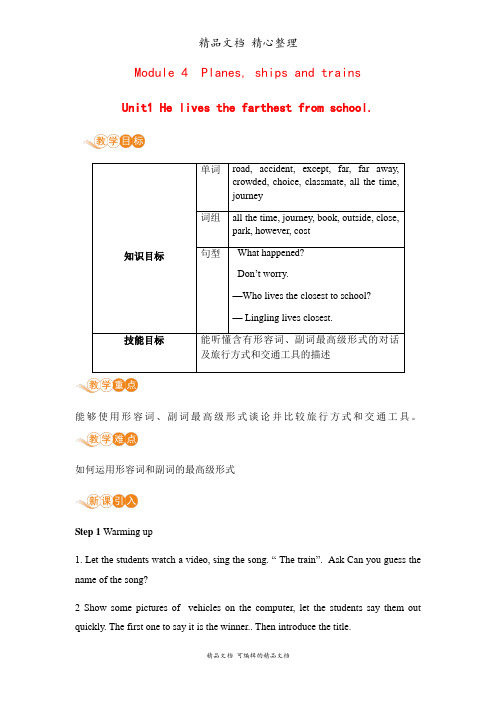
Module 4 Planes, ships and trains Unit1 He lives the farthest from school.单词road, accident, except, far, far away,能够使用形容词、副词最高级形式谈论并比较旅行方式和交通工具。
如何运用形容词和副词的最高级形式Step 1 Warming up1. Let the students watch a video, sing the song. “ The train”. Ask Can you guess the name of the song?2 Show some pictures of vehicles on the computer, let the students say them out quickly. The first one to say it is the winner.. Then introduce the title.Step 2 Listening and words1. Work in pairs. Show some pictures and ask “How do you often go to school?”2. Look and say something about the pictures.3. Introduce the new words.4. Learn the new words.5. Read the new words.Step 3 Look and match.1.Ask the students to read the words in Activity 1Step 4 Look, listen and match.Step 5 Listen and read.1. Show some pictures, and ask the students to talk about them.2. Ask the students to read the conversation silently.3. Play the recording and ask the students to listen the conversation, and then answer the questions.4. Read the conversation.5. Act it out.Step 6 Complete the table.Step 7 Pronunciation and speakingStep 8 GrammarA写出下列单词的最高级形式:1. short _________________2. nice _________________3. big _________________4. thin _________________5. early _________________6. slowly _________________7. beautiful _________________ 8. carefully _________________ 9. badly _________________ 10. much _________________11. little _________________ 12. far __________________B. 单项选择:( ) 1. Debbie is growing fast. She is even________ than her mother.A. tallB. tallerC. tallestD. the tallest ( )2.—Dad, would you please drive ________?— No hurry. We have enough time before the plane takes off.A. fasterB. more slowlyC. more carefully( ) 3.—Do you know Lin Shuhao?—Yes. He is one of _____ basketball players in the NBA.A. popularB. more popularC. the most popular( ) 4. Is Lily’s home _____ away from school than Linda’s?A. farB. fartherC. farthest .( ) 5.—Who ran ______ of all in the sports meeting?—Hector did, I think.A. fastB. fasterC. the fastestD. most fast( ) 6. Li Na is ________ tennis player in China now.A. most famousB. the most famousC. more famous完成请完成《》P28对应习题本节课通过PPT训练学生的表达能力,通过图片、情景学单词,做到词不离句。
新外研版八年级下册英语 Module 4 Unit 1 教案(教学设计)

Module 4Seeing the doctorUnit 1I haven’t done much exercise since I got my computer.单cough, fever, headache, stomachache, toothache,1. Present perfect with the use of “since” and “for”.2. To understand the conversation between a doctor and a patient.现在完成时的瞬间动词和延续性动词; 现在完成时的for短语和since短语的区别。
1. Play a video and sing asong with the students:Are you healthy andstrong? Let’s share thevideo: Healthy Song2. Free talk:When you see a doctor,he usually asks you somequestions like this:What’s wrong with you? /What’s the matter withyou?Are you feeling well?How long have you beenlike this?教师活动She felt terrible.5. Lindadidn’t feel welllast week. She_________(咳嗽) all dayand all night.Ⅱ. 用所给词的适当形式填空。
1. Aunt Mary_________(ill) for morethan three days.2. Rick _________(learn)a lot about Chineseculture since he came toChina.3. Lucy _________(live)in China since five yearsago.4. Reading in the sun is_________(harm) to youreyes.5. Mr Liu_________(stay) in hisoffice since eight o’clockthis morning.价。
英语外研版八年级上册Module4Unit1导学案(无答案)

B.Eliza travelled most of Europe by ship.
C.Eliza thinks the car ride is just like a moving party.
D.Greg can bring his pet dog along
____________________________________
Step3.Listenagain and then act it out. ( B层)
Step4.I can speak.(C层).
Talk about how do you go to school
--How do you gotoschool?
C.by train D.by plane
48.What does Eliza think of travelling by train?
A.Comfortable. B.Slow.
C.Boring. D.Exciting.
49.Danny likes travelling by plane because ________.
I also like travelling by ship.It is a very great way to spend a holiday.I can go to parties and watch movies on the ship,and enjoy the blue sky and water.
—Hector did, I think.
A. fast B. faster C. the fastest D. most fast
( ) 5. —Did your father go out in the afternoon, Tony ?
Module4Unit1导学案外研版英语八年级上册

Module 4Planes, ships and trains主题内容及学习目标主题范畴:人与社会子主题:交通1. 语言知识:掌握相关词汇、句子,并描述交通方式和交通工具。
2. 文化知识:了解英语国家有关的旅游文化和交通信息,拓展视野。
3. 语言技能:掌握形容词和副词最高级的构成和用法。
4. 学习策略:使用最高级谈论不同的交通方式和交通工具。
Unit 1He lives the farthest from school.课前预习单词和短语重点单词名词1. 路;(尤指)公路road2. 交通事故;意外事件accident•(短语)一场事故an accident3. 选择choice•(v.)选择choose4. 同班同学classmate形容词5. 拥挤的;人数过多的crowded•(n.)人群;观众(v.)挤满;塞满crowd介词 6. 除……之外except兼词7. (ad v.)远;遥远(adj.)远的;遥远的far8. (adj.)(距离上)近的,接近的(ad v.)(距离上)接近地close重点短语1. 迟到be late2. 发生了什么事?What happened?3. 一点儿a bit4. 远离far from5. 和……一样the same as6. 一直;不断地all the time根据语境或提示,完成填空。
1. There is an a ccident(交通事故) at the corner.2. The People's Square is very c rowded at night.3. He is my c lassmate of junior middle school.4. Do not be late(迟到) for school every day.5. The two brothers look the same as(和……一样) each other.6. He is working in the room all the time(一直).7. My house is far from(远离) the school, so I often go to school by car.佳句仿写1. But nobody was late,except me.2. That's a good choice, but it's a bit dangerous.3. He lives the farthest from school, so he takes the underground.4. Her home is the closest to school, so she walks.句子仿写我们家没有人喜欢看电视,除了我。
外研八年级下学期:模块四第一单元导学案(无答案)
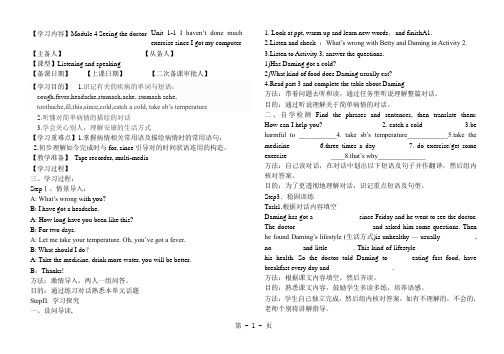
Unit 1-1 I haven’t done muchexercise since I got my computer 【主备人】【从备人】【课型】Listening and speaking【备课日期】【上课日期】【二次备课审批人】【学习目的】 1.识记有关的疾病的单词与短语:cough,fever,headache,stomach,ache, stomach ache,toothache,ill,this,since,cold,catch a cold, take sb’s temperature2.听懂对简单病情的描绘的对话3.学会关心别人,理解安康的生活方式【学习重难点】1.掌握病情相关常用语及描绘病情时的常用语句;2.初步理解如今完成时与for, since引导对的时间状语连用的构造。
【教学准备】Tape recorder, multi-media【学习过程】三、学习过程:StepⅠ、情景导入:A: What’s wrong w ith you?B: I have got a headache.A: How long have you been like this?B: For two days.A: Let me take your temperature. Oh, you’ve got a fever.B: What should I do?A: Take the medicine, drink more water, you will be better.B:Thanks!方法:激情导入,两人一组问答。
目的:通过练习对话熟悉本单元话题StepΠ. 学习探究一、设问导读, 1. Look at ppt, warm up and learn new words,and finishA1.2.Listen and check :What’s wrong with Betty and Daming in Activity 2.3.Listen to Activity 3, answer the questions.1)Has Daming got a cold?2)What kind of food does Daming usually eat?4.Read part 3 and complete the table about Daming方法:带着问题去听和读,通过任务型听说理解整篇对话。
外研版英语八年级下册Module4-Unit1-导学案
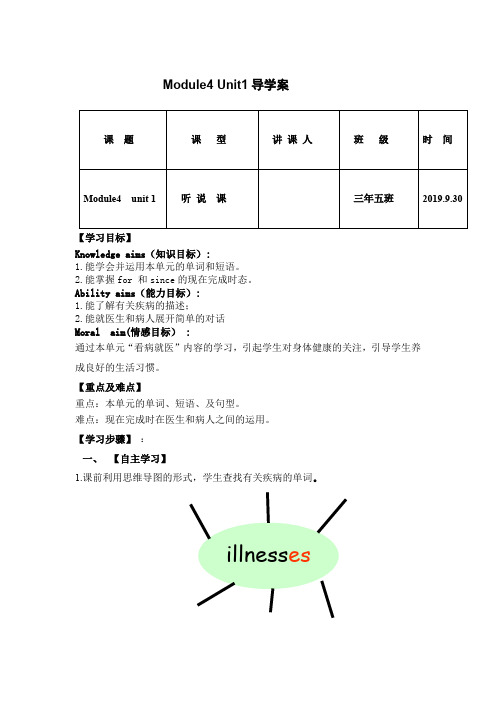
Module4 Unit1导学案【学习目标】Knowledge aims(知识目标):1.能学会并运用本单元的单词和短语。
2.能掌握for 和since的现在完成时态。
Ability aims(能力目标):1.能了解有关疾病的描述;2.能就医生和病人展开简单的对话Moral aim(情感目标) :通过本单元“看病就医”内容的学习,引起学生对身体健康的关注,引导学生养成良好的生活习惯。
【重点及难点】重点:本单元的单词、短语、及句型。
难点:现在完成时在医生和病人之间的运用。
【学习步骤】:一、【自主学习】1.课前利用思维导图的形式,学生查找有关疾病的单词。
1.感冒_______________________2.咳嗽_________________________________3.头疼_________________________4.发烧________________________________5.感觉病了______________________6.胃疼_______________________________7.停止吃快餐_________________________________________________________8.每天吃早饭_________________________________________________________9.锻炼_____________________________10.吃药____________________________ 11.对....有害______________________12.量体温____________________________13.一天三次_______________________14.不严重___________________________二、【合作探究】Step 1: Warm upFree talk:Step 2: Pre- listening导入和呈现:Look at the pictures and learn new words and expressions.Task 1: 出示图片深化单词并引出短语及名词后缀的学习。
外研版八年级英语上册教案Module 4 Unit 1
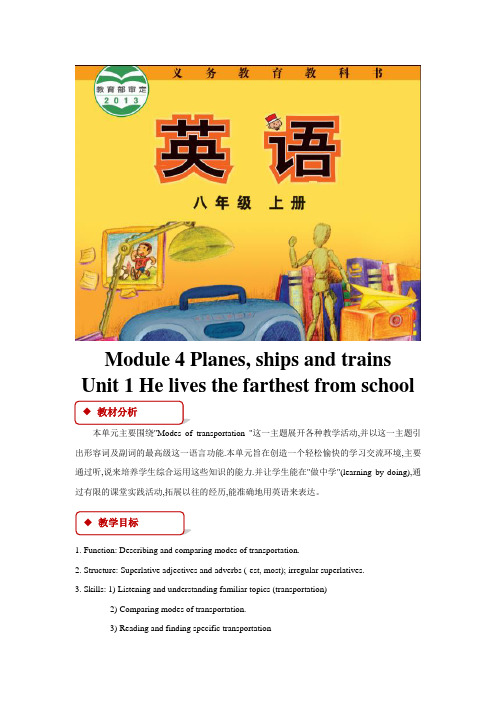
Module 4 Planes, ships and trains Unit 1 He lives the farthest from school本单元主要围绕"Modes of transportation "这一主题展开各种教学活动,并以这一主题引出形容词及副词的最高级这一语言功能.本单元旨在创造一个轻松愉快的学习交流环境,主要通过听,说来培养学生综合运用这些知识的能力.并让学生能在"做中学"(learning by doing),通过有限的课堂实践活动,拓展以往的经历,能准确地用英语来表达。
1. Function: Describing and comparing modes of transportation.2. Structure: Superlative adjectives and adverbs (-est, most); irregular superlatives.3. Skills: 1) Listening and understanding familiar topics (transportation)2) Comparing modes of transportation.3) Reading and finding specific transportation4) Writing a short passage comparing modes of transportation.4. Around the world: The longest railway5. Task: Making a holiday plan for a family trip to a city in China.Tape recorder, OHP, videoTeacher show some pictures of some famous places, let students say their name. Teacher:Do you know this place?Ss: Beijing\London\ParisStep 2 Lead inA: How do you go to school?B: I go to school by ______ / on foot.Teacher show different ways of transportation, teach the new words.Step 3 Presentation1.Let Ss work in pairs, ask and answer the following questions.How do you get there?What is the most comfortable way to go to there?What is the cheapest way to get there?2.PracticeLook at the pictures, and say something about the pictures.My father goes to work by bus.Most of our classmates go to school by bike. It’s very cheap.It’s the fastest train in the world. It’s modern.Mum often goes to work by taxi. It’s the most comfortable way.The Black’s are going to travel to London by ship.Many people take the underground to work. It’s crowded.They travel to Beijing by plane. It’s the most expensive way.3.Conclusion: 表达交通方式1.骑自行车ride to … = go to…by bike/on a bike2.乘公共汽车go to… by bus/on a bus = take/catch a bus3.坐汽车drive to …= go to…by car/in a car4.乘火车go to …by train/on a train =take /catch a train5.乘轮船by ship /sea6.乘飞机fly to…=go to…by plane/air/on a plane7.乘渡轮by ferry8.乘地铁take the underground = go to ... by subway4. Words and expressionsStep 4 Exercise1.Match the words from in the box with the pictures.2.Listen and match the words in the box with the pictures in Activity 1. You need to use one word more than once.3.Listen and underline the words the speaker stresses.1. —Who lives the closest to school?— Lingling lives closest.2. — What is the most comfortable way to go to school for Betty?— By taxi.Now work in pairs. Listen again and repeat.4.Ask and answer questions about the ways of going to school. Use the words in the box to help you.—What’s the most expensive way to go to school?— Going by taxi is the most expensive.— How about by bus, is it a good way to go to school?— It is cheap, but so crowded.5. Listen and readMum: ______________, but it’s a bit dangerous. There’s ______________.Betty: But most of my classmates ride bikes, and it’s_________. Don’t worry. I’ll __________ Mum: How does Tony go to school?Betty: He lives ________________ school, so he ______________.Mum: And what about Lingling?Betty: Her home is _______________school, so she walks.Mum: And what about Daming?Betty: He goes by bus too, _____________. But it’s so crowded! And the traffic is _________. Mum: ___________. You can ride your bike to school, but remember ____________ all the time.6. After listening, complete the table.Ways to go to schoolBettyTonyLinglingDaming7plete the sentences with the correct form of the words in the box.1. The _________________ way to go to school is by taxi.2. Tony lives the __________ from school.3. Lingling’s home is the _________ to school, so she always walks.4. For Betty, going to school by bike is the ______ choice.Everyday EnglishWhat happened? 发生什么事情了?Don’t worry.别担心。
外研版八年级英语下册Module4 Unit1教学设计
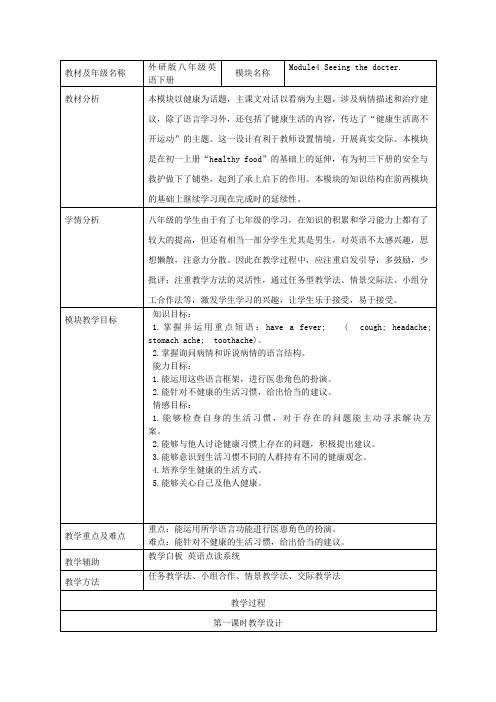
如:How long have you been like this? For a week.
主要功能是让学生通过学习能就医生和病人展开简单的英文对话,同时培养学生的健康的生活方式。
课时教学目标
知识目标:
学生能学会并运用本单元的单词短语,如:cough, fever, headache, stomach ache, catch a cold,……掌握for和since现在完成时态,如:I haven’t done much exercise since I got my computer. I have been ill for about three days.How long have you……?
模块教学目标
知识目标:
1.掌握并运用重点短语:have a fever; ( cough; headache; stomach ache; toothache)。
2.掌握询问病情和诉说病情的语言结构。
能力目标:
1.能运用这些语言框架,进行医患角色的扮演。
2.能针对不健康的生活习惯,给出恰当的建议。
情感目标:
本模块以健康为话题,主课文对话以看病为主题,涉及病情描述和治疗建议,除了语言学习外,还包括了健康生活的内容,传达了“健康生活离不开运动”的主题。这一设计有利于教师设置情境,开展真实交际。本模块是在初一上册“healthy food”的基础上的延伸,有为初三下册的安全与救护做下了铺垫,起到了承上启下的作用。本模块的知识结构在前两模块的基础上继续学习现在完成时的延续性。
教学内容
教学活动
设计意图
教师活动
学生活动
Step 1:
导入和呈现
2022年外研版八上《Module 4 Unit 1》导学案
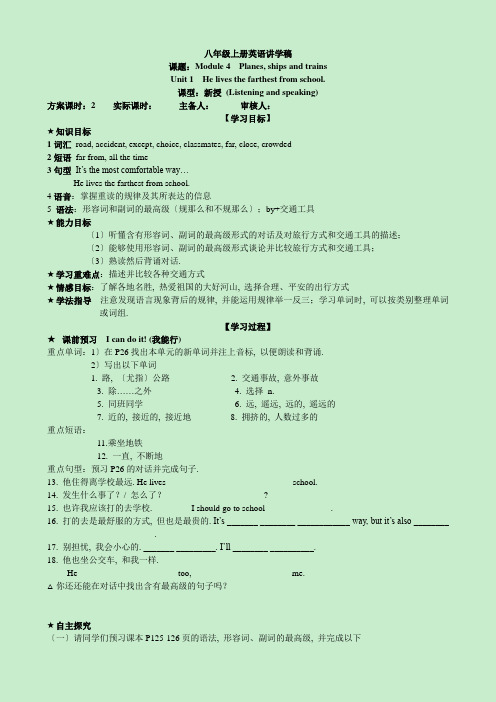
八年级上册英语讲学稿课题:Module 4 Planes, ships and trainsUnit 1 He lives the farthest from school.课型:新授(Listening and speaking)方案课时:2 实际课时:主备人:审核人:【学习目标】★知识目标1词汇road, accident, except, choice, classmates, far, close, crowded2短语far from, all the time3句型It’s the most comfortable way…He lives the farthest from school.4语音:掌握重读的规律及其所表达的信息5 语法:形容词和副词的最高级〔规那么和不规那么〕;by+交通工具★能力目标〔1〕听懂含有形容词、副词的最高级形式的对话及对旅行方式和交通工具的描述;〔2〕能够使用形容词、副词的最高级形式谈论并比较旅行方式和交通工具;〔3〕熟读然后背诵对话.★学习重难点:描述并比较各种交通方式★情感目标:了解各地名胜, 热爱祖国的大好河山, 选择合理、平安的出行方式★学法指导注意发现语言现象背后的规律, 并能运用规律举一反三;学习单词时, 可以按类别整理单词或词组.【学习过程】★课前预习I can do it! (我能行)重点单词:1〕在P26找出本单元的新单词并注上音标, 以便朗读和背诵.2〕写出以下单词1. 路, 〔尤指〕公路________2. 交通事故, 意外事故_________3. 除……之外_____________4. 选择n. ___________5. 同班同学_______________6. 远, 遥远, 远的, 遥远的__________7. 近的, 接近的, 接近地_______ 8. 拥挤的, 人数过多的__________重点短语:11.乘坐地铁___________________12. 一直, 不断地__________________重点句型:预习P26的对话并完成句子.13. 他住得离学校最远. He lives ________ __________ _________ school.14. 发生什么事了?/ 怎么了?__________ ___________?15. 也许我应该打的去学校. ________ I should go to school _______ _______.16. 打的去是最舒服的方式, 但也是最贵的. It’s _______ ________ ____________ way, but it’s also ________________ ____________.17. 别担忧, 我会小心的. _______ _________. I’ll ________ __________.18. 他也坐公交车, 和我一样.He _______ ______ ________ too, ________ _______ ______ me.△你还还能在对话中找出含有最高级的句子吗?____________________________________________________________________________________________________________________________________________________★自主探究〔一〕请同学们预习课本P125-126页的语法, 形容词、副词的最高级, 并完成以下练习.写出以下形容词和副词的比较级和最高级19.good ___________ ___________ 20. heavy ___________ _________21. long ___________ ___________ 22. big _____________ ___________ 23. bad ____________ ___________ 24. funny __________ ___________ 25. slowly ______________ ______________ 26. many __________ ____________27. beautiful _________________________ ___________________________28.expensive _____________________ _____________________〔二〕请注意下面词汇或句型的用法1. Maybe I should go to school by taxi. 也许我应该坐出租车去上学.by+交通工具名词〔名词前无冠词〕“乘, 坐〞如:travel ______ train/ car/ ship/ plane 乘火车/ 汽车/ 轮船/ 飞机出行2. But nobody was late, except me.except prep. “除……之外〞强调被除去的局部不包括在内, 常与all, every, no, nothing等含有整体意义的词连用, 除去的局部常与整体是同类事物. 如:1) We have an English lesson every day _________ Sunday.2) All the students went to the museum last Sunday _________ Tom. Tom went to see hisgrandparents in the countryside.besides prep. “除......之外〞强调被除去的局部是包括在内的.3)All the students went to the museum last Sunday _________ Tom. Tom also liked theexhibits in the museum.★课前准备通过预习, 你还有哪些问题不懂?请在课本上或讲学稿上标出来_________________ ________________________________________________________________________★课堂学习研讨I.预习情况检查II. 听力策略培养:1. Match the words in the box with the pictures. (Activity 1)2. Listen and match the words with the pictures in Activity 1.( Activity 2)3. Listen to the dialogue in Activity 3 and find out the ways to school.III. 对话理解(Activity 3〕1. How do the children go to school? Why?2. Language points and grammar.3. Reading aloudIV. 词汇运用(Activities4 and 5)V. 口语训练1. Activity 6:Listen and mark the words the speaker stresses.2. Activity 7: Ask and answer questions about the ways of going to school.★稳固练习I. 用方框内所给词的适当形式填空big, pretty, important, bad, handsome(英俊的)1. The young man looks ________________ than before.2. My English is _________________ of all my subjects.3. The box is ________________ than that one. You can’t carry it.4. Reading is as ______________ as listening.5. I think she is _________________ of those super girls(超女).II. 单项选择( ) 6. Who listens ______ , Tom, Jack or Bill?A. the most carefullyB. more carefullyC. the most carefulD. more careful( ) 7. --- ______ do you go home? --- I often go home by train.A. WhereB. WhenC. HowD. Why( ) 8. ---Who gets up _____ of you all in the dormitory(宿舍), Tony? ---Jimmy does.A.earlyB. earlierC. earliest( ) 9. She is ______ of us. A. good B. better C. the best D. best( ) 10. The more we are together, the _____ we will be.A. happyB. happierC. happiestD. the happiest( ) 11. They are going to London _______ train.A. withB. byC. forD. of( ) 12. David usually ______ the bus to school.A. tookB. bringC. rideD. takes( ) 13. ______ Tom, they passed the exam. Tom thought(认为) he was the worst student.A. ExpectB. BesidesC. BesideD. From( ) 14. Li Kai jumped ______ in the long jump. He won the game.A. longestB. farthestC. highest( ) 15. ---Today is the _____ day in my life, because I won the first prize(一等奖) in the competition(比赛).--- Congratulations.A. happyB. happiestC. happierD. much happierIII. 补全对话A: 16 does Tony get to school?B: He goes by bus. It’s the best way to get to school.A: How about Daming ?B: 17 he has the fastest journey, he goes by bike.A: But it’s the 18 dangerous way. And what about Lingling?B: Her home is the closest to the school, 19 she walks. Does our English teacher always go to work by taxi? A: Yes. He sometimes 20 the train.16. ______ 17. ______ 18. _______ 19. _______ 20. _______IV.阅读理解I’m a boy from Chengdu, Sichuan. There’re three people in my family ---my parents and I. We plan to go to Shenzhen next week. It’s about 1,500 kilometres from Chengdu to Shenzhen. We can go there by bus, by plane or by train. My father wants to go there by bus. He thinks it is the most interesting way to go because the bus will pass many different places. My mother wants to go there by train. She thinks it is the cheapest way to go, because the train fare(票价) is th e lowest. However, I want to go there by plane. I think it’s the quickest way to go, because the journey takes about one hour by plane. It’s also the most comfortable way to get to Shenzhen, but it’s the most expensive way of all.根据短文内容判断正(T)误(F)( ) 21. Shenzhen is the boy’s hometown.( ) 22. There’re three ways to go to Shenzhen from Chendu according to the passage.( ) 23. The most interesting way to go there is by plane.( ) 24. Taking the train costs the least money.( ) 25. The fastest way to get to Shenzhen is by air.★学后/教后反思:______________________________________________________第一课时一、学习目标:1. 初步掌握本课重点词汇和句型2. 初步理解课文内容, 提高有关英语学习话题的听力技能3. 熟悉给别人提建议的方法二、学习重点:通过对话初步掌握给别人提建议的方法三、学习难点:理解并初步掌握对话中出现的提建议的各种句型课前预习一、使用说明与学法指导:1. 朗读并识记单词表中本课新词汇, 不会读的用红笔标记2. 试读听力局部的单词及课文对话, 初步理解对话, 不会读或不能理解的用红笔标记二、教材助读:1. 朗读并识记听力局部的单词并根据活动预测听力内容, 为听力扫除障碍2. 朗读并理解课文对话, 找出对话中提出建议的句子:_____________________________________________________________________________ _____________________________________________________________________________ _____________________________________________________________________________ _____________________________________________________________________________ 三、预习自测(一) 用英语读出并写出以下单词1 . 语法2 . 使完全3 . 句子4 . 改正5 . 拼写6 . 练习7 . 词典8 . 字母9 . 理解、明白10 . 建议11 . 应该12 . 发……的音13 . 大声地14 . 电台, 播送15 . 关键性的16 . 主要的17 . 极好的, 优秀的(二) 翻译以下短语, 并把它们背下来1 . 查阅, 查找2 . 犯错误3 . 写下, 记下4 . 同意某人5 . 需要做某事6 . 像……一样重要7. 联系做某事8. 给某人建议四、我的疑问:_____________________________________________________________________________ _____________________________________________________________________________课内探究一、情景导入:What does English include (包含)?How do you learn English?Do you have any advice for learning English well?二、洗耳运动完成听力局部三、逐步完成Listen and read及后面的练习四、质疑探究熟读以下句子, 组内相互练习, 并思考讨论其中包含的句子结构:1 . We should always speak English in class.2 . Let’s try to speak English as much as possible.3 . Why not write down the mistakes in our notebooks?4 . Don’t forget to write down the correct answers next to the mistakes.5 . It’s a good idea to spell and pronounce new words aloud every day.6 . How about listening to the radio?7 . You just need to listen for key words and main ideas.]8 . Why don’t we try to find some English pen friends?五、当堂检测一、根据句意及汉语提示完成单词.1 . Could you please speak again ? I can’t u______________ you .2 . Li Mei __________________ (练习) speaking English every morning .3 . There are 26 l__________________ in English .4 . Let’s try to speak English as much as P__________________ .5 . ________________ (完成)the sentences with the correct form of the words .6 . Lin Shuhao is an ____________________ (优秀的) basketball player in NBA.7 . Could you tell me how to ____________________ (发音) the word ?8 . You should read English newspapers ___________________ (大声地) .9 . The ________________ (播送) says that it is going to rain tomorrow .10 . What’s the ___________________ (主要的) idea of this passage ?二、用所给词的适当形式填空.1.Why don’t you _________________ ( listen ) to the radio now ?2.What’s the Chinese _________________ ( mean ) of this word ?3.I’m sorry your _________________ ( spell ) is wrong again .4.Jack made a few __________________ ( mistake ) in the English exam .5.Little Tom wants to know the __________________ ( pronounce ) of this word .六、课后反思_____________________________________________________________________________ _____________________________________________________________________________课后训练一、单项选择( ) 1. Miss Liu gave us _________ about how to learn English.A . some advice B. some advices C. a good advice D. an advice ( ) 2. Here are some phone numbers. Please __________ in your notebook.A. write down themB. write them downC. write down itD. write it down( ) 3. If you don’t know the word, you can find its ____________ in the dictionary.A. translateB. to translateC. translatingD. translation ( ) 4. __________ make a birthday card for her?A. Why don’tB. How aboutC. Let’sD. Why not ( ) 5. __________ playing computer games?A. Why notB. Shall weC. How aboutD. Why don’t you ( ) 6. It’s bad for you to copy(抄袭) others’ homework . __________ do it again.A. Don’t tryB. Not try toC. Try not toD. Try not二、按要求完成以下各题.1 . Let’s read an English newspaper every day. (改为同义句)___________ __________ reading an English newspaper every day?2 . You should drink more water. (改为否认句)You ___________ ____________ drink more water.3 . Why don’t you walk to school? ( 改为同义句)____________ ______________ walk to school?4 . Spelling new words every day is a good idea. (改为同义句)____________ a good idea ___________ spell new words every day.5 . 我们应该相互帮助. (根据汉语提示完成句子)We ___________ help ____________ ____________.课后学习指导:仔细理解课文对话, 熟读并在组内分角色朗读第二课时一、学习目标:1. 熟练掌握本课重点词汇和句型2. 能听懂和理解与英语学习相关的话题3. 熟练掌握给别人提建议的方法二、学习重点:通过对话学会给别人提建议三、学习难点:通过对话学会给别人提建议课前预习一、使用说明与学法指导:1. 通过语音训练拓展日常交际用语2. 通过对话表演方式大胆开口, 能用英语进行有关英语学习话题的交流3、观察对话总结给别人提出建议的方法二、教材助读:1. 朗读并理解语音局部的句子, 注意语音语调2. 通过提示试着理解活动七的题意并思考该活动三、预习自测根据汉语提示翻译以下句子:1. 我们为什么不把他们写下来呢?________________________________________________2. 你应该及时(in time)纠正练习中的错误. __________________________________________3. 每天读英语报纸是一个好主意. _________________________________________________4. 经常检查你的词汇笔记本怎么样?______________________________________________5. 尽量不要将查阅每一个单词. ___________________________________________________6. 非常感谢, 托尼. ______________________________________________________________7. 玲玲经常帮助他的妈妈做家务. _________________________________________________8. 这是一个好主意. _____________________________________________________________9. 我们需要尽可能多地读英语报纸. _______________________________________________10. 别忘了每天听播送. __________________________________________________________四、我的疑问:_____________________________________________________________________________ _____________________________________________________________________________课内探究一、情景导入思考:How can we give others some advice?二、按要求完成语音局部两个活动三、质疑探究(一) 通过本课的学习, 归纳运用以下句型结构, 并相互练习:1. Why don’t we / you …?2. We / You should …3. It’s a good idea to …4. How about …?5. Let’s try to …6. Don’t forget to ...(二) 知识要点探究1. Why don’t we try to find some English pen friends? 我们为何不尽量找一些英国笔友呢?Why not write down the mistakes in our notebooks? 为何不在我们的笔记本里记下错误呢?1〕这里Why don’t we do…? 是用来表示提出某种建议, 而不是询问为什么不做某事的原因. 其简略形式为: Why not do…? 如:Why don’t you ask the teacher? = Why not ask the teacher? 为何不问问老师呢?2〕也可以用What about / How about…? 来提出建议, about为介词, 后接名词或动名词-ing形式. 如:What about taking little Tom along with us?3〕还可以用Would you like…? 来提出建议, 意为“你想要…吗?, would like 后可接名词或动词不定式. 如: Would you like a cup of tea? 你想要杯茶吗?Would you like to go and see her? 你想要去见她吗?牛刀小试:如果我们要提建议“我们去散步〞, 在英语中可有这几种表达法:____________________________________________________________________________________________________________________________________________________________________________________________________________________________________________________________________________________________________________________2. What else? 还有什么吗?else为形容词, 意为“别的;其他的〞, 一般放在特殊疑问词或不定代词的后面. 如:Who else did you see at the meeting? 你在会上还看到谁了?Dose anyone else want to read this book? 还有其他人想要看这本书吗?other也表示“其他的〞, 但只能用于修饰名词并放在名词前. 如:Did you see other classmates? 你看到其他同学了吗?They left early and other friends left late. 他们很早就离开了, 其他朋友离开得晚.牛刀小试:English is difficult for him, but nothing ________ is.对于他来说英语很难, 但其他没有什么是困难的.I will finish my homework first and then do ___________ things.我将首先完成家庭作业, 然后做其他事情.3. It’s a good idea to spell and pronounce new words aloud every day.每天大声拼读新词是一个好主意.句中it 是形式主语, 后面的动词不定式短语to spell and pronounce new words aloud every day是真正的主语.注意:在“ It is + adj.+ of / for s b. + to do sth.〞句型中, 假设形容词是描述不定式行为发出者的性格、品质的, 如:kind, good, nice, right, wrong, clever, careful, polite等, 介词用of;假设形容词仅仅是描述事物的特征, 如:difficult, easy, hard, important, dangerous等, 介词那么用for. 如:It’s very kind of you to help me. 你能帮我真好.It’s clever of you to finish the exercises so quickly. 你真聪明, 这么快就完成了这些联系.牛刀小试:It’s very dangerous _______ children to cross the busy street.对孩子来说, 穿过这条交通繁忙的街道是危险的.It’s difficult _______ us to finish the work. 对我们来说, 完成这项工作很困难.It’s a good way ___________ down the new wor ds. 记下新词是一个好方法.4. Let’s try to speak English as much as possible. 我们尽可能多地说英语吧.try to do sth. 表示“尽力/努力做某事〞. try (not )to do sth. 表示“尽力(不要)做某事〞. 如:类似的结构还有:ask sb. (not) to do sth. 叫某人〔不要〕做某事;tell sb. (not) to do sth. 告诉某人〔不要〕做某事.拓展:try还可以接动词的-ing形式表示“尝试、试图做某事〞. 如:You should try learning a new language. 你应该试试学一门新的语言.牛刀小试:翻译句子:这学期我们将努力学好所有学科. ______________________________________________ Jack正在试着用筷子(chopsticks). ______________________________________________ 请告诉贝蒂不要等我. _______________________________________________________ 你叫丽莎买一份报纸了吗?__________________________________________________ 结构“as ... as possible〞表示“尽可能……〞, 相当于“as ... as sb. can / could〞.牛刀小试:Please write back ________ ________ ________ _________. 请尽快回信.Mrs Black gave me ________ ________ help ________ ________.布莱克夫人给予我尽可能多的帮助.Jane finished the work as quickly as possible. (转换同义句)Jane finished the work __________ __________ _________ __________ _________.四、当堂检测(一) 用单词的适当形式填空:1. The _____________ (spell) of the word is not right.2. It’s not a good idea to learn English by _______________ (translate).3. My grandfather always reads some _______________ (newspaper) before breakfast.4. There are all kinds of _____________ (radio). Which one do you like?5. The boy wasn’t careful and he made some ______________ (mistake) in his homework.(二) 用方框内适当单词的正确形式填空correct, match, term, message, excellent, number, orchestra1. Kate said, “I should study hard this ____________.〞2. How about ____________ the right pictures with the letters?3. Could you please help me find out the ___________ spelling of this word?4. David is an ___________ student in our school ____________.5. My sister isn’t at home. Can I take a ____________ for you?五、课后反思_____________________________________________________________________________ _____________________________________________________________________________课后训练一、单项选择( ) 1 . Miss Liu gave us _________ about how to learn English.A . some adviceB . some advicesC . a good adviceD . an advice ( ) 2 . Here are some phone numbers, please __________ in your notebook.A . write down themB . write them downC . write down itD . write it down( ) 3 . If you don’t know the word , you can ____________ in the dictionary.A . look up itB . look after itC . look it upD . look for them ( ) 4 . __________ make a birthday card for her?A . Why don’tB . How aboutC . Let’sD . Why not ( ) 5 . Don’t forget _________ the door when you leave home.A . closeB . closedC . closingD . to close ( ) 6 . __________ playing computer games?A . Why notB . Shall weC . How aboutD . Why don’t you ( ) 7 . It’s better __________ early in the morning.A . startB . to startC . startingD . started( ) 8 . I think English is as ___________ Chinese.A . important asB . important thanC . more important thanD . important ( ) 9 . It’s bad for you to copy others’ homework . __________ do it again.A . Don’t tryB . Not try toC . Try not toD . Try not ( ) 10 . It will be sunny soon. You don’t need __________ an umbrella .A . to takeB . takeC . takingD . took二、按要求完成以下各题.1 . Let’s read an English newspaper aloud. (改为同义句)___________ __________ reading an English newspaper aloud?2 . You should drink more water. (改为否认句)You ___________ ____________ drink more water.3 . It’s a good idea to write new words in groups.(对画线局部提问)___________ ____________ a good idea?4 . Why don’t you walk to school? ( 改为同义句)____________ ______________ walk to school?5 . Spelling new words every day is a good idea. (改为同义句)____________ a good idea ___________ spell new words every day.。
- 1、下载文档前请自行甄别文档内容的完整性,平台不提供额外的编辑、内容补充、找答案等附加服务。
- 2、"仅部分预览"的文档,不可在线预览部分如存在完整性等问题,可反馈申请退款(可完整预览的文档不适用该条件!)。
- 3、如文档侵犯您的权益,请联系客服反馈,我们会尽快为您处理(人工客服工作时间:9:00-18:30)。
Module 4 Unit 1导学案
八年级英语新授初二英语备课组时间:序号:
一、学习目标:
1. To know how to use the video camera on a mobile phone and to operate a CD
recorder.
2. To give instructions of using a piece of technology.
3. To understand the first conditional clause(1).
二、学习重、难点:
The first conditional clause(1).
三、导学过程:
1.Listen to the tape and say what is happening.
2.Read the dialogue by yourselves first and then listen to the tape and try to understand
it. Next answer the questions.
a.Why does Sally have the CD recorder?
b.What do they do to find out how it works?
c.How do they know if it’s working?
d.Why isn’t Sally playing on the recording?
e.Why do they think Chen Huan wants to hear Sally, not Kylie?
f.What do they decide to do?
3.Pay attention to the following:
turn on / turn off wait for connect…to…come on
四、训练设计:
Ⅰ、根据句意和首字母提示完成单词。
1.If your printer doesn’t work, p________ the green button.
2.If you can’t find the k________ to the door, let me help you.
3.If you don’t understand what I said, read the i________ again.
4.You should e_________ why you were late again.
5.You can say “c_________” if you want to have a nicer picture.
6.Read the t__________ more carefully if you can’t grasp the meaning.
Ⅱ、翻译下列短语。
1. 拍短片
2. 阅读说明
3. 按相机键
4. 稍等一会儿
5. 连接
6. 打开
7. 查找8. 轮流做
9. 录像机10. 录音重放
11. 赶快12. 对某人重要
13. 按红键14. 拉小提琴
15. 通过电子邮件发送录音
Ⅲ、根据汉语提示完成句子.
1.你可以在词典上查到那个新单词.
You can ________ _______ the new word __________ the dictionary.
2.如果你愿意去的话, 请告诉我.
________ you _________ go, please tell me.
3.如果绿灯还没亮, 就等一会儿.
_________ the green light _________ ________, wait for a minute.
4.我想知道她是否愿意留下来.
I wondered _________ she __________ stay here.
5.他问我是否认识那个人.
He asked me _________ I ________ that man.
Ⅳ.阅读理解.
Last week Bill went to New York. It was his first time to go there, and he didn’t know his way around the city. He had a meeting at 10:00, and he wanted to be on time. The meeting was in the Peterson Building on 34th Street, but Bill didn’t know there. Two men stood at the corner. He asked them the way to the Peterson Building.
“Pardon me,” he said, “but can you tell me how to get to the Peterson Building on 34th Street?”“Sure,” answered one of the two men. “You can get there in five minutes. Go to the next corner and turn left. Walk three blocks and there you are.”
But the other man said, “There’s a better way. Get on the bus here at this corner. It stops right near the Peters Building.”
“Not Peters,” Bill told them, “Peterson.”
Then the first man said, “Oh, that’s on East 34th, not West 34th. It’s quite a long way from here. You have to take a bus.”
But the second man told Bill, “No, you should take a train. It’ll take you to the Peterkin Building.”“Peterson. Not Peterkin.”Bill looked at his watch. It was almost ten o’clock. “Thanks a lot.” Bill said, “I’ll take a taxi”
As he got into the taxi he saw arguing and pointing the different ways. Next time he wanted to get to a place, he should ask a policeman!
1.Bill went to New York in order to ___.
A.go to the cinema.
B. have a meeting.
C. visit the city
D. go home
2.Bill’s meeting was at ___. A.10:00p.m B.22:00 C.12:00a.m D.10:00a.m
3.Two men were arguing to each other about ___.
A.the way to Peterson Building.
B. The meeting
C.How to get to the hotel
D. Taking a bus or train
4. Bill finally ___. A. walked to the place B. didn’t go to the Perterson Building
C. took a taxi
D. took the subway
中考链接:
1. Kate, could you _____ the radio a bit? Your father is sleeping now.
A. turn down
B. turn off
C. turn up
D. turn on
2. Study hard, _____ you’ll pass the exam.
A. or
B. and
C. but
1。
